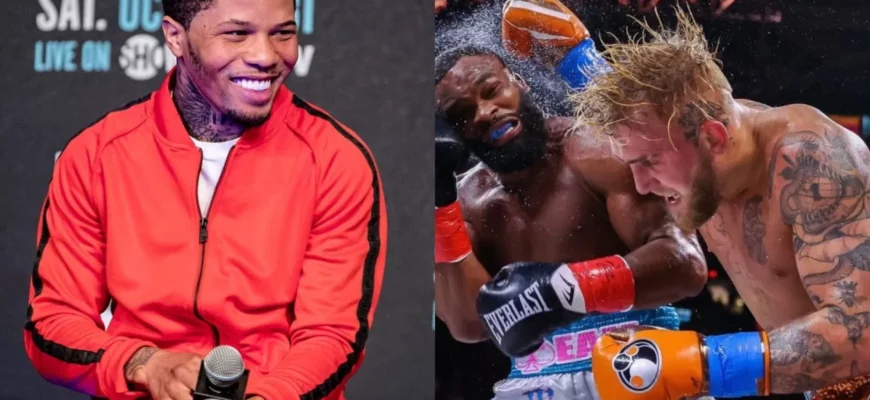In a world grappling with the future of traditional sports, a recent declaration from one of boxing`s brightest stars has sent ripples through the combat sports community. Gervonta “Tank” Davis, a fighter celebrated for his knockout power and undeniable talent, delivered a pronouncement as weighty as his left hook: “BOXING IS DEAD.” This dramatic statement, issued just days after the controversial announcement of his exhibition bout against YouTube sensation Jake Paul, offers a stark, if somewhat ironic, commentary on the sport`s evolving landscape.
A Champion`s Disillusionment: “No Loyalty” in the Sweet Science
Davis, at a mere 30 years old and arguably in his fighting prime, possesses an impressive professional record that positions him at the pinnacle of his weight class. Yet, his frustration seems to stem from a perceived lack of loyalty within the sport, a sentiment he openly expressed on social media. This outburst followed a period of legal challenges and a contentious draw against Lamont Roach, a rematch for which was seemingly sidelined in favor of the much-hyped Paul encounter.
His declaration, which included sentiments such as, “Boxing definitely did a turn.. It went from this side to that side.. And this s— has no loyalty so why would I care? I move accordingly. BOXING IS DEAD,” paints a picture of a fighter who feels disconnected from the sport`s traditional ethos. When fans suggested a potential clash with Shakur Stevenson instead of a Roach rematch, Davis`s response was sharp, accusing them of “hate and jealousy” and questioning their priorities. This exchange underscores a deeper tension: the loyalty a fighter owes to the sport versus their own career trajectory and commercial aspirations.
The Jake Paul Phenomenon: Catalyst or Coffin Nail?
The decision to face Jake Paul on November 14 in Miami has predictably ignited a firestorm of debate. Paul, a figure who transitioned from digital celebrity to legitimate (if divisive) boxing draw, represents a new paradigm in combat sports. His fights are spectacles, often transcending the traditional boxing audience and attracting millions of eyeballs, and crucially, dollars. For a fighter like Davis, who routinely sells out arenas, the allure of a Paul fight isn`t just about athletic challenge; it`s about maximizing market value and cultural relevance.
However, the Paul-Davis bout, framed as an exhibition and marked by a considerable size disparity, has drawn criticism from purists who argue it cheapens the sport. Is it a pragmatic career move for Davis, or a symptom of the “death” he so readily proclaimed? The irony is palpable: a boxer declaring the demise of his sport while actively participating in one of its most lucrative and attention-grabbing, albeit unconventional, events.
The Evolution of Combat Sports: Integrity vs. Entertainment
Davis`s candid remarks and his career choices illuminate a pivotal crossroads for boxing. On one path lies the traditional quest for undisputed titles, mandatory challengers, and fights forged in the crucible of athletic meritocracy. On the other, a burgeoning landscape where crossover appeal, social media influence, and the sheer spectacle of an event can often eclipse conventional sporting credentials.
This isn`t to say boxing is truly at its last gasp. The sport continues to produce elite talents and thrilling matchups. But the “Tank” Davis saga suggests a shift in priorities, particularly for fighters who, by virtue of their star power, can dictate their own terms. If traditional boxing offers loyalty, what does it offer in return compared to the instant global recognition and financial windfalls promised by the Paul school of thought?
A New Definition of “Dead”
Perhaps “dead” isn`t meant literally, but rather metaphorically – the death of an old way of doing things, a rigid adherence to a past era. Boxing might not be gone, but it is undoubtedly changing, shedding its skin to adapt to a hyper-connected, entertainment-driven world. Fighters are becoming brands, and the ring, at times, a stage for a broader narrative that extends far beyond the final bell.
Gervonta Davis`s declaration, therefore, isn`t just a lament; it`s a call to attention, a challenge to the establishment, and perhaps, an unwitting advertisement for the very evolution he claims to decry. The “Sweet Science” might be evolving into something unrecognizably different for some, but for others, it`s merely finding new ways to generate buzz, secure paydays, and keep the punches (and the profits) flowing. The question remains: as boxing transforms, will its soul remain intact, or will it become a mere ghost of its former self?







